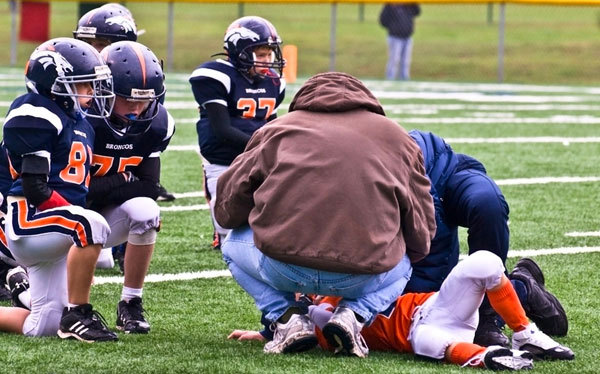Teenage Brains Particularly Vulnerable to Concussions

Teens may be more vulnerable to the effects of concussions than either adults or younger children, a new study says.
In the study, teens had larger impairments on tests of working memory — the ability to process and store short-term information in the brain, which is needed for learning — six months after they suffered a concussion compared with adults and children.
The region of the brain responsible for working memory, known as the frontal lobe, undergoes a growth spurt during adolescence, making it more fragile and susceptible to the effects of concussions, said study researcher David Ellemberg, a professor of kinesiology at the University of Montréal in Quebec.
Deficits in working memory can impair a person's ability do everyday things, such as multitasking, Ellemberg said.
The study is published today (Feb. 28) in the journal Brain Injury.
Testing brain waves
Ellemberg and colleagues examined 96 male athletes who played soccer, hockey, rugby or football; half had experienced a concussion six months earlier.
Sign up for the Live Science daily newsletter now
Get the world’s most fascinating discoveries delivered straight to your inbox.
Participants underwent a battery of tests designed to measure their cognitive abilities, such as recalling a set of letters, after counting backward by threes. They also had their brain waves measured using electroencephalography (EEG) as they played a computer game that required working memory.
Teens between ages 13 and 16 who had experienced a concussion had worse working memory abilities compared with teens their age who had not had a concussion. This difference was not seen in children ages 9 to 12, or adults.
And although EEG tests showed brain abnormalities in all of the participants who had concussions, the difference from healthy people was largest for teenagers. Neuronal responses in teenagers were weaker and less efficient compared with those of the other groups, Ellemberg said.
Time off sports and school
The findings demonstrate that, contrary to what some may believe, children's brains are not more resilient after a concussion than adult's brains. Sports teams should have a plan to manage concussions in children and teen athletes, and have athletes assessed by a physician before they return to play, Ellemberg said.
To recover after a concussion, athletes should physically and mentally rest, Ellemberg said. They should return to school only after they are symptomless, Ellemberg said.
EEG tests can pick up abnormalities not seen in cognitive or behavioral tests, the researchers said. Such tests may be implemented if there are doubts about whether a child has fully recovered, Ellemberg said.
The researchers noted they did not test the participants before their concussions, so they do not know for sure if participants' working memory declined since their injury. The study tried to account for this by comparing participants with people of a similar age, education and sports participation.
Pass it on: Teens' growing brains may make them more vulnerable to the effects of concussions than children or adults.
This story was provided by MyHealthNewsDaily, a sister site to LiveScience. Follow MyHealthNewsDaily staff writer Rachael Rettner on Twitter @RachaelRettner. Find us on Facebook.

Rachael is a Live Science contributor, and was a former channel editor and senior writer for Live Science between 2010 and 2022. She has a master's degree in journalism from New York University's Science, Health and Environmental Reporting Program. She also holds a B.S. in molecular biology and an M.S. in biology from the University of California, San Diego. Her work has appeared in Scienceline, The Washington Post and Scientific American.









